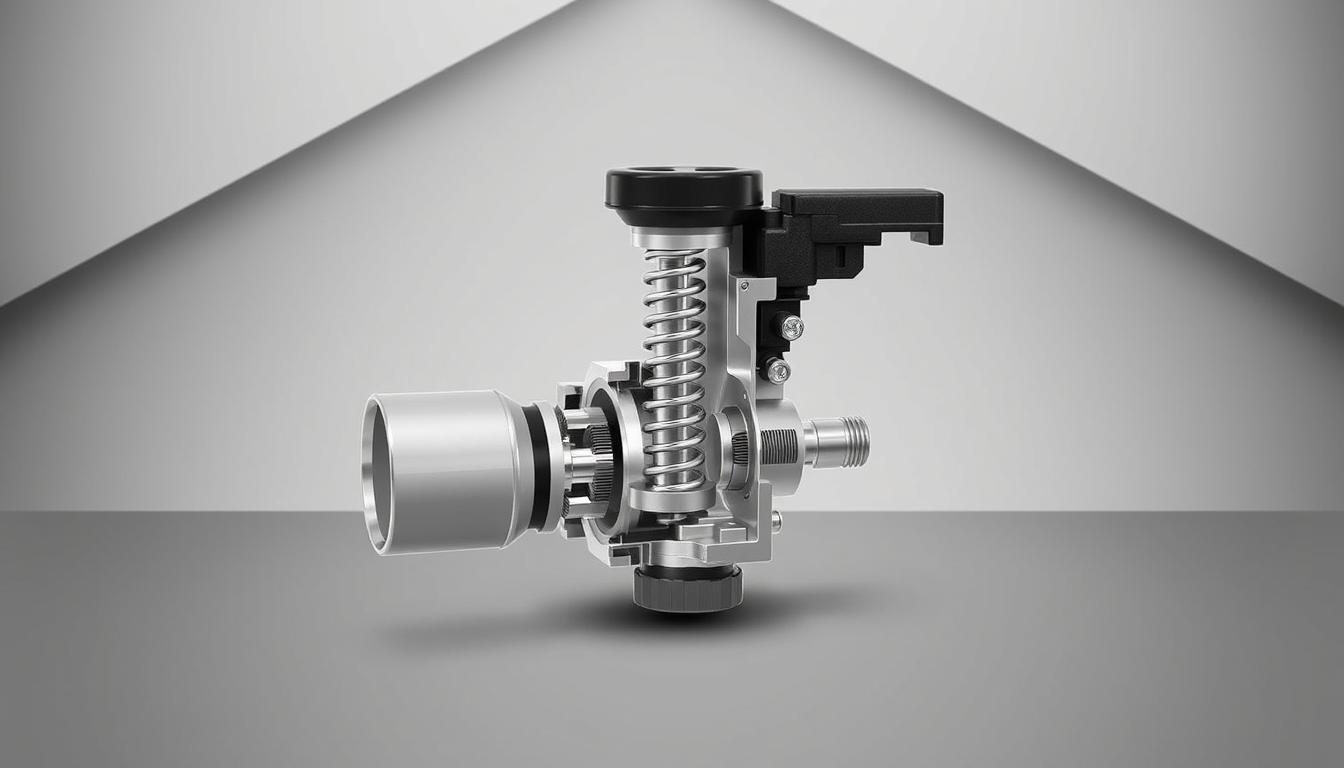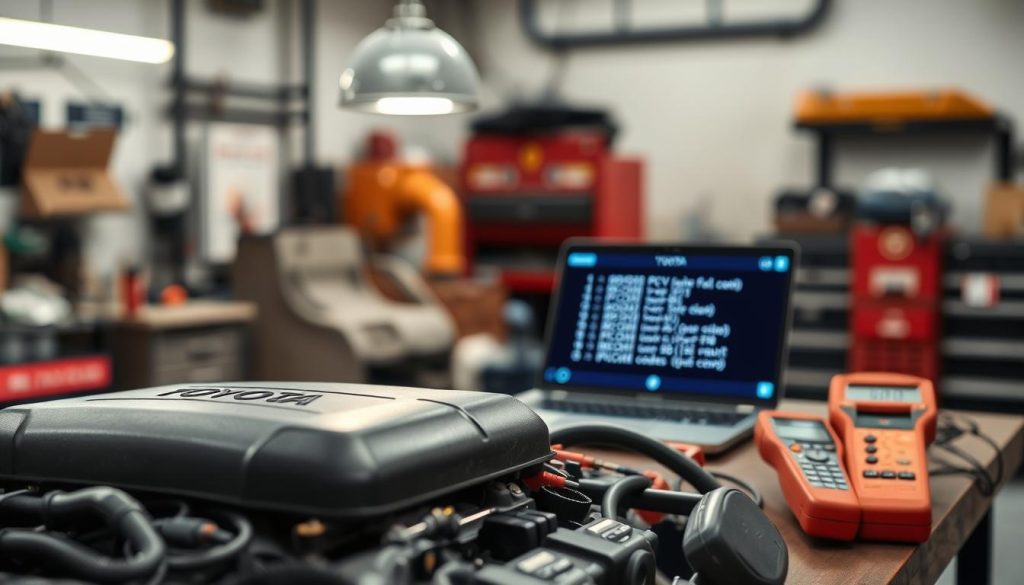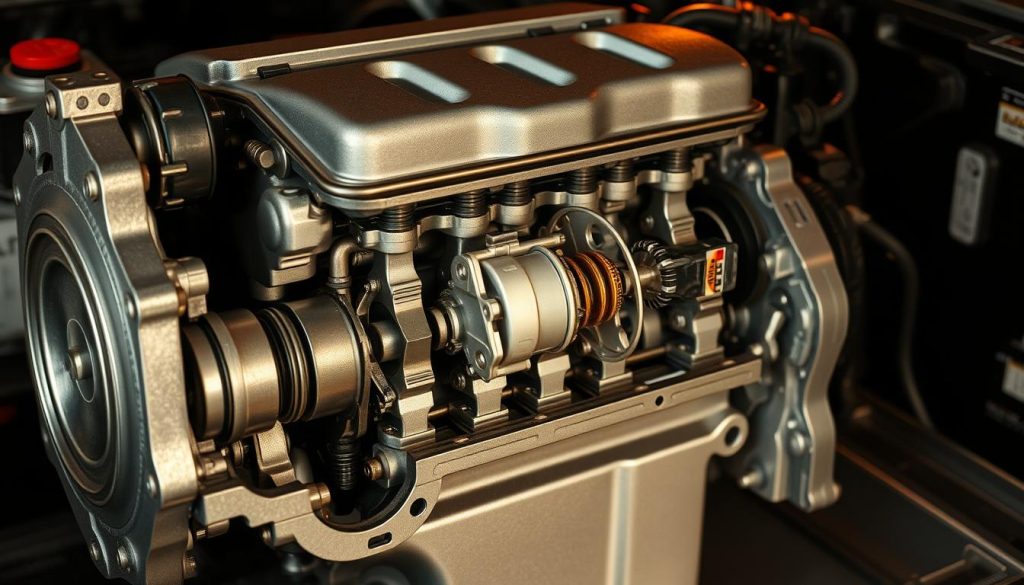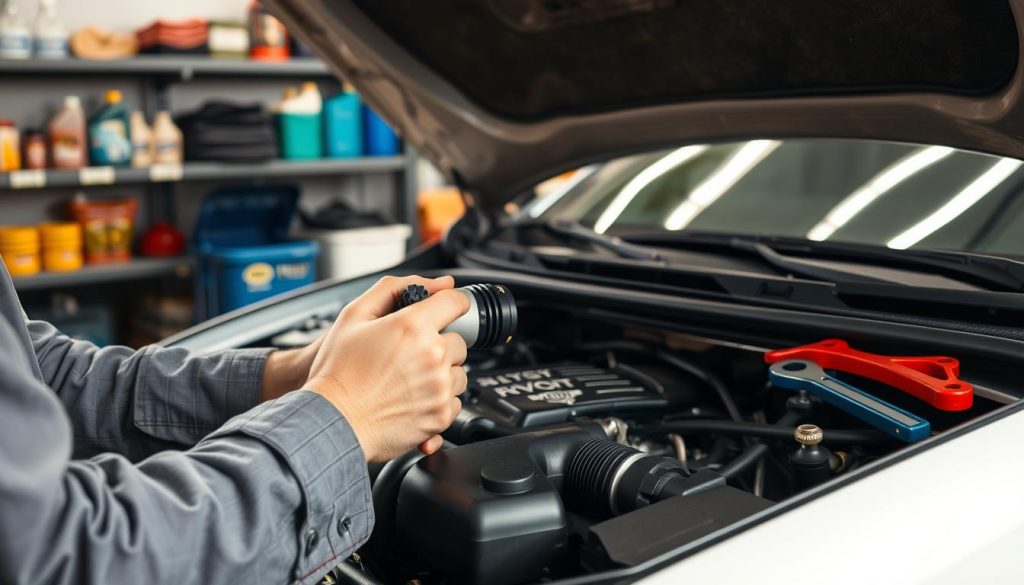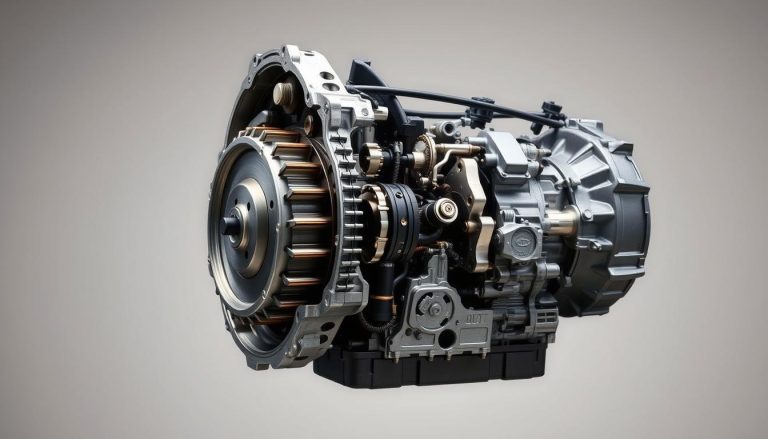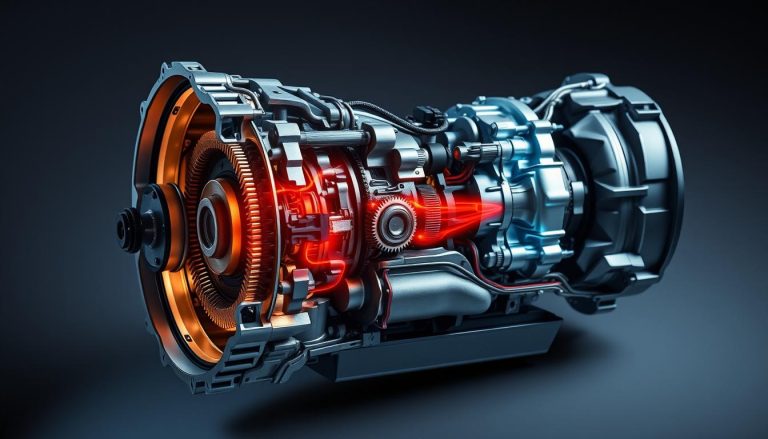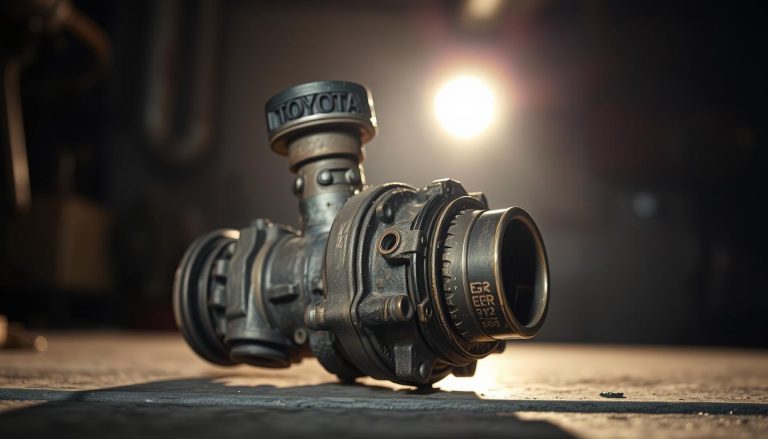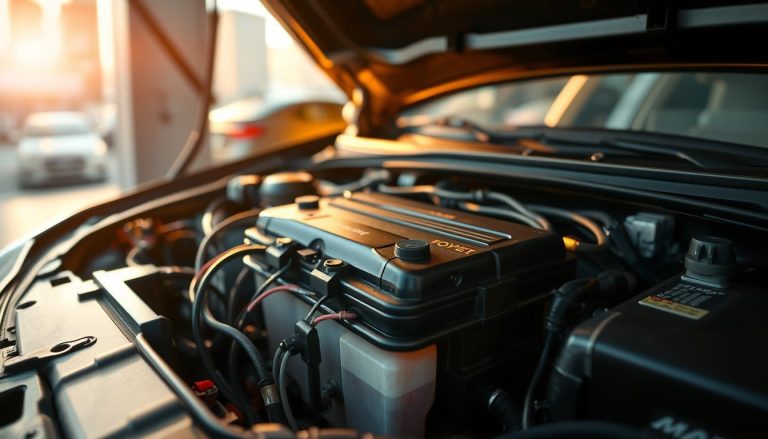Toyota PCV Valve Issues – Causes & Solutions
The PCV (Positive Crankcase Ventilation) valve is key in Toyota cars. It keeps engine pressure right and removes bad gases. This helps your engine run well and keeps the air clean.
If the PCV valve gets clogged or breaks, big problems can happen. You might see your car idle roughly, use more fuel, or even leak oil. Knowing how to fix these issues can save you a lot of trouble and keep your car in top shape.
Keeping your PCV valve in good shape is vital. It prevents expensive fixes and keeps your car running efficiently. Let’s look closer at how it works, what signs show it’s not working right, and how to fix it.
Understanding the Role of a PCV Valve
The Positive Crankcase Ventilation (PCV) valve is key to your Toyota’s engine health and performance. It makes sure crankcase gases go back into the engine’s intake. This helps burn these gases again, cutting down emissions and preventing damage.
The Toyota PCV valve function is vital. It’s usually found on the engine valve cover. It helps prevent oil leaks and boosts fuel efficiency by ensuring clean burning. The engine vacuum controls the flow through the PCV valve, adjusting it based on engine conditions.
The PCV valve importance cannot be overstated. It stops sludge from building up in the engine. This is key for keeping the engine well-lubricated and preventing damage. A faulty PCV valve can cause oil leaks, engine misfires, and rough idling, hurting your car’s performance and lifespan.
It’s important to regularly check and maintain the PCV valve. This should be part of your engine care routine. Regular checks and timely replacements help protect your Toyota and keep it running smoothly.
| Aspect | Description |
|---|---|
| Function | Regulates and directs crankcase gases back into the engine’s intake manifold |
| Importance | Prevents oil leaks, enhances fuel efficiency, and reduces emissions |
| Maintenance | Regular inspections and timely replacements |
| Common Issues | Oil consumption, engine misfires, rough idling |
Common Symptoms of a Faulty PCV Valve
Spotting Toyota PCV valve symptoms early can save you from expensive repairs later. It’s key to know these signs to keep your car running well. Here are the common signs you should watch out for.
Engine Misfire
A faulty PCV valve often causes engine misfire. This happens when the valve messes with the air-fuel mix, making some cylinders not work right. You’ll see your car’s performance drop, and the check engine light might come on.
Rough Idling
It’s important to notice if your car idles roughly. A bad PCV valve can make the idle speed unstable. You might see the engine shake or wobble while it’s idling, showing there’s a problem with the crankcase pressure.
Decreased Fuel Efficiency
Another sign is if your car uses more fuel than usual. A faulty PCV valve can make your car burn more gas. This is because it messes with the air-fuel ratio, making the engine less efficient and using more fuel.
What Causes PCV Valve Problems?
Knowing the causes of Toyota PCV valve issues helps car owners prevent problems. Three main reasons cause these issues: carbon buildup, oil sludge, and debris. These can lead to PCV valve clogging and failure.
Carbon Buildup
Engines produce carbon residue during combustion. Over time, this carbon can block the PCV valve system. Regular cleaning helps prevent carbon buildup and keeps your engine running well.
Oil Sludge
Oil sludge is another big problem for PCV valves. It forms when oil breaks down due to heat and poor maintenance. This sludge can block the valve, causing pressure issues and less engine efficiency.
Debris Accumulation
Debris and particles in the engine can also cause PCV valve problems. These can clog the valve, stopping it from working right. Regular checks and timely replacements help avoid PCV valve failure from debris.
| Causes | Impact | Preventive Measures |
|---|---|---|
| Carbon Buildup | PCV Valve Clogging | Regular Cleaning |
| Oil Sludge | Pressure Imbalances | Proper Maintenance |
| Debris Accumulation | Valve Obstruction | Timely Replacements |
How to Diagnose Toyota PCV Valve Issues
Checking Toyota PCV valve problems is key to keeping your engine running well. You need to use different methods to get accurate results and fix problems. Here, we’ll look at important ways to find PCV valve issues in your Toyota.
Visual Inspection
Begin with a detailed PCV valve inspection. Look for oil leaks or blockages that could mean a clogged or broken valve. Also, check the hoses for cracks or wear. These can affect how well the PCV system works.
Vacuum Gauge Test
Use a PCV valve testing with a vacuum gauge to check its work. Connect the gauge to the intake manifold and watch the readings. If they’re off, it could mean blockages or failing parts in the PCV system.
Listen for Abnormal Noises
Also, listen for odd sounds from the PCV valve when the engine is on. Hissing or whistling might mean air leaks. Rattling sounds could show internal damage. This step is important for spotting Toyota PCV valve problems and fixing them.
Combining a visual check, vacuum gauge test, and listening for odd noises gives a full view of PCV valve issues. By doing these steps, you can find and fix problems, keeping your engine in top shape.
Toyota PCV Valve Problems: Signs and Solutions
Toyota PCV valve issues can show up in many ways, affecting your car’s performance and life. Spotting these signs early is key to fixing your Toyota PCV valve.
Oil Leaks
Oil leaks are a common sign of PCV valve trouble. A clogged or broken PCV valve can cause too much pressure in the engine. This pressure can make oil leak out of seals and gaskets. If you see oil under your car or stains on your driveway, it’s time to fix your PCV valve.
Increased Exhaust Smoke
Seeing more exhaust smoke is another sign of a bad PCV valve. A faulty valve can make the fuel mixture richer, causing denser smoke. This smoke is not just a sign of leaks but also a warning of engine damage to come.
To fix these problems, you might need to clean or replace the PCV valve. It’s also important to check hoses and connections for any blockages or damage. Fixing these issues quickly keeps your Toyota running well. Toyota’s repair solutions focus on these parts to keep your engine running smoothly.
Steps to Replace a Toyota PCV Valve
Replacing a Toyota PCV valve is easy with the right tools and some basic knowledge. Follow these steps for a smooth installation.
- Locate the PCV Valve: Check your Toyota’s manual to find the PCV valve. It’s usually on the valve cover or engine block.
- Remove the Old PCV Valve: Disconnect the hose from the valve. Use a wrench or pliers to remove the old valve. Be careful not to harm nearby parts.
- Install the New PCV Valve: Put the new valve in the same spot. Hand-tighten it, then use a wrench for a tighter fit.
- Reconnect the Hose: Securely attach the hose to the new valve.
- Test Your Work: Start the engine and check for leaks. Make sure there are no unusual noises or performance problems.
Learning to replace a PCV valve can save you time and money. Whether you do it yourself or get help, a well-maintained valve keeps your engine running smoothly.
The Importance of Regular PCV Valve Maintenance
Keeping your PCV valve in check is key for your Toyota engine’s health. Regular checks and services can stop many engine problems. This makes your car run better and more efficiently.
Preventing Engine Damage
Regular PCV valve checks stop engine damage. A good PCV valve keeps harmful gases out, avoiding oil contamination. This saves you money and makes your engine last longer.
Improving Fuel Efficiency
Another big plus of PCV valve checks is better fuel use. A working PCV valve keeps the air-fuel mix right, leading to better fuel use. This means your Toyota runs better and saves you money on gas.
Cost of PCV Valve Replacement for Toyota
Keeping your Toyota in top shape is important. Knowing the costs for a PCV valve replacement is key. The price can change based on labor, parts, and whether you do it yourself or get a pro.
Labor and Parts
The cost to replace a PCV valve varies by location and Toyota model. Professional labor can cost between $50 to $150. The PCV valve itself usually costs between $20 to $50.
| Type | Cost Range |
|---|---|
| Labor | $50 – $150 |
| Parts | $20 – $50 |
| Total | $70 – $200 |
DIY vs Professional Replacement
Choosing between DIY and professional service affects your costs. DIY saves on labor but needs skill and tools. Professional service ensures quality but costs more.
The final cost of replacing a PCV valve depends on your skills, location, and Toyota model. Knowing these factors helps you plan your maintenance budget better.
Benefits of a Well-Maintained PCV Valve
A well-maintained PCV valve is key for your Toyota engine’s performance and emissions control. This often-overlooked part greatly affects your vehicle’s efficiency and lifespan. Keeping the PCV valve in check offers many benefits.
Enhanced Engine Performance
One major perk of a good PCV valve is better engine performance. It keeps the crankcase pressure right, stopping oil leaks. It also keeps the engine clean by stopping harmful stuff from getting into the oil.
This leads to more efficient burning in the engine. Your engine gets more power and runs smoother.
Emission Control
A well-maintained PCV valve also helps control emissions. It sends gases back into the engine to burn again. This cuts down on harmful gases, making your Toyota meet emission standards.
By keeping your PCV valve in shape, you help the environment. You also make the air cleaner.
- Key Benefits:
- Improved engine efficiency
- Reduced harmful emissions
- Prevention of engine damage from contaminants
- Extended engine life
Common Diagnostic Fault Codes Related to PCV Valve Issues
When checking PCV problems in Toyota cars, you often see codes like P0171, P0172, and P2187. These codes mean the air-fuel mix is off, usually because of a bad PCV valve. This affects how well the engine works.
P0171 – System Too Lean
The P0171 code means the engine’s air-fuel mix is too lean. This could be because of too much air or not enough fuel. A broken PCV valve lets too much air in, upsetting the mix and causing this code.
P0172 – System Too Rich
On the other hand, P0172 shows the system is too rich. This means there’s too much fuel or not enough air. A clogged PCV valve stops gases from leaving, making the engine add more fuel to balance it out.
P2187 – System Too Lean at Idle
P2187 points to a lean condition at idle. This usually means there’s a vacuum leak or a bad PCV valve. These problems mess with the air-fuel mix needed for a smooth idle. Finding and fixing PCV issues in Toyotas with this code is key to fixing engine problems.
Cleaning vs Replacing a PCV Valve
Choosing between cleaning and replacing a PCV valve is key for your Toyota’s engine health. Knowing when to replace and when to clean the PCV valve is important. This helps keep your engine running smoothly. Here are some tips for maintaining your PCV valve.
When To Clean
If the PCV valve is only slightly clogged and looks good, cleaning it might be enough. This approach saves money and extends the valve’s life. Use the right solvents to clean it and make sure it works well.
Check the valve often and clean it when you see minor blockages. This stops bigger problems from happening.
When To Replace
Knowing when to replace a PCV valve is critical. If it’s badly worn, damaged, or full of sludge, it’s time for a new one. Replacing it keeps the PCV system working right and avoids engine troubles.
Replacing an old or broken valve also improves your engine’s performance. It helps avoid expensive repairs later on.
Impact of a Malfunctioning PCV Valve on Toyota’s Engine
A bad PCV valve can really hurt your Toyota engine’s performance. It can cause many engine problems, making it less efficient and powerful. Here’s what happens:
Power Reduction
When the PCV valve goes wrong, it can’t vent crankcase gases properly. This leads to too much pressure and harmful stuff in the engine. It makes the engine work hard, using more fuel and losing power. The PCV valve is key to keeping the engine running well, and a problem here makes things worse.
Sluggish Acceleration
PCV valve issues also make your Toyota engine slow to accelerate. A faulty valve messes up the air-fuel mix, making the engine run too lean or too rich. This messes with how fast and quick your car goes, making it feel weak when you press the gas. Fixing PCV valve problems quickly is important to keep your Toyota running right.
| Effect | Impact on Toyota Engine |
|---|---|
| Power Reduction | Engine power decreases due to improper crankcase ventilation and inefficiencies in fuel combustion. |
| Sluggish Acceleration | Disrupted air-fuel mixture results in poor acceleration and reduced engine responsiveness. |
PCV Valve Location in Toyota Models
It’s important to know where the Toyota PCV valve location is to keep your engine running well. The PCV (Positive Crankcase Ventilation) valve is usually found near the engine’s top. It’s connected to the valve cover, making it easy to find. But, the exact spot can change based on your Toyota model and engine type.
If you want to locate PCV valve Toyota, check your owner’s manual. It has diagrams and steps to help you find it. Or, a skilled mechanic can quickly show you where it is.
In different Toyota models, the PCV valve can be found in a few places:
- On or near the valve cover
- Connected via a hose to the intake manifold
- Adjacent to the throttle body
Knowing where the Toyota PCV valve location is helps you take care of it. This keeps your engine running smoothly and lasts longer.
Preventive Measures to Avoid PCV Valve Problems
Regular maintenance is key to avoiding Toyota PCV valve issues. A proactive approach keeps your Toyota’s engine in top shape. This avoids costly repairs and keeps your vehicle running smoothly.
Regular Inspections
Regular PCV valve inspections are vital to catch problems early. Routine checks help spot wear and tear early. This ensures any issues are fixed before they get worse.
Make sure to include a thorough PCV valve inspection in your vehicle’s maintenance schedule.
Timely Replacements
Replacing the PCV valve on time is also critical. An old or faulty valve can harm engine performance and fuel efficiency. Regular checks and quick replacements keep your Toyota running well.
By following these steps, like regular inspections and timely replacements, you can extend your engine’s life. This brings peace of mind and reliable performance to your vehicle.
Expert Tips for Maintaining Your Toyota’s PCV Valve
Keeping your Toyota’s PCV valve in good shape is key for your engine’s health. It’s important to check the valve often for wear. This can stop small problems from turning into big, expensive fixes.
Also, don’t skip your vehicle’s scheduled service times. Sticking to these schedules lets you catch small issues early. This keeps the air and gases moving well in your engine.
Choosing the right parts is also vital for your engine. When it’s time to replace the PCV valve, go for genuine Toyota parts. They fit right and last longer, keeping your engine in top shape.
Cleaning the PCV valve regularly is another smart move. Dirt and oil can block the valve, causing problems. Adding a PCV valve check to your maintenance routine keeps your engine running smoothly.
By following these tips, you can improve your Toyota engine care. Regular checks, timely replacements, and quality parts all help. They make your engine more reliable and efficient, saving you money and time.
Conclusion
Keeping your Toyota’s PCV valve in check is a small task with big benefits. This summary of Toyota PCV valve maintenance shows why it’s key to know, find, and fix PCV valve problems fast. Regular checks and timely replacements can prevent engine issues like misfires, rough idling, or bad fuel efficiency.
Good Toyota vehicle care is more than just oil changes. It’s about keeping the engine clean and running smoothly. Problems like carbon buildup, oil sludge, and debris can be stopped with regular checks. Spotting signs like more exhaust smoke or oil leaks early can help keep your engine running well for longer.
This guide aims to help Toyota owners take care of their PCV valve. This knowledge helps keep your engine running great. Whether you do it yourself or get a pro to check, knowing about your PCV valve saves time, money, and stress. Keeping up with maintenance keeps your Toyota running smoothly and reliably.
FAQ
What is the function of the PCV valve in Toyota vehicles?
The PCV valve controls engine pressure and removes harmful gases. It sends these gases back into the intake manifold for burning. This keeps the engine running well and prevents oil leaks.
What are the common symptoms of a faulty PCV valve in Toyota vehicles?
Signs include engine misfire, rough idling, and decreased fuel efficiency. You might also see oil leaks and more exhaust smoke. These point to air-fuel mix problems or high crankcase pressure.
What causes PCV valve problems in Toyota vehicles?
Problems come from carbon buildup, oil sludge, and debris. These block gas flow and cause pressure issues, affecting the valve’s work.
How can I diagnose PCV valve issues in my Toyota?
Look for oil leaks or blockages visually. Use a vacuum gauge test to check the valve. Also, listen for unusual noises that might mean leaks or clogs.
What are the signs and solutions for Toyota PCV valve problems?
Signs are oil leaks and more exhaust smoke. Fixing it means cleaning or replacing the valve. Also, check hoses and connections for damage.
How do I replace a Toyota PCV valve?
Find the PCV valve at the engine’s top. Remove the old one and put in a new one. Your vehicle’s manual will guide you on how to do it right.
What is the importance of regular PCV valve maintenance?
Regular care stops engine damage and boosts fuel efficiency. It ensures gases are expelled right and keeps the air-fuel mix balanced. This improves your vehicle’s performance and life.
How much does it cost to replace a PCV valve in Toyota vehicles?
Costs vary based on DIY or professional service. Labor, parts, and location also play a part in the total cost.
What diagnostic fault codes are related to PCV valve issues in Toyota?
Fault codes like P0171, P0172, and P2187 show air-fuel mix problems. These often mean a bad PCV valve.
Should I clean or replace my Toyota’s PCV valve?
Decide based on clog and damage level. Cleaning works for minor issues. But, replace if the valve is badly damaged.
How does a malfunctioning PCV valve impact Toyota’s engine performance?
A bad PCV valve reduces power and makes acceleration slow. The engine has trouble with pressure and gas processing.
Where is the PCV valve located in Toyota models?
It’s near the engine’s top, attached to the valve cover. Location can vary by model, so check your manual or ask a mechanic.
What preventive measures can avoid PCV valve problems in Toyota vehicles?
Regular checks and timely replacements are key. Catching symptoms early helps avoid bigger problems.
What expert tips are there for maintaining my Toyota’s PCV valve?
Experts suggest regular cleaning and using quality parts. Stick to service schedules to keep the valve working well and support engine health.

